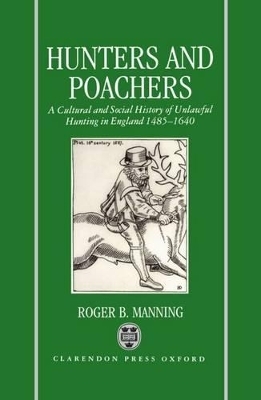
Hunters and Poachers
A Social and Cultural History of Unlawful Hunting in England 1485-1640
Seiten
1993
Clarendon Press (Verlag)
978-0-19-820324-7 (ISBN)
Clarendon Press (Verlag)
978-0-19-820324-7 (ISBN)
A study of hunting and poaching, both of which played significant roles in England during the 16th and 17th centuries. It explores symbolic and covert forms of protest, and adds to the knowledge of the interaction between aristocratic and popular culture in early-modern England.
This is a scholarly study of hunting and poaching, both of which played significant roles in England during the sixteenth and seventeenth centuries. Deer-hunting was an integral part of aristocratic and gentry culture. It afforded not only recreation, but also served as a symbolic substitute for war and revellion. It provided the occasion for adolescent rites of passage, displays of power and feats of daring, the pursuit of aristocratic feuds and competition for forest and game offices. The distinction between lawful and unlawful hunting remained unclear, for the Game Laws were obscure and difficult to enforce, and tumultuous hunting was frequently a reaction to changes in land use and conflicting use-rights.
Professor Manning's meticulously researched study explores symbolic and covert forms of protest, and adds much to our knowledge of the interaction between aristocratic and popular culture in early modern England.
This is a scholarly study of hunting and poaching, both of which played significant roles in England during the sixteenth and seventeenth centuries. Deer-hunting was an integral part of aristocratic and gentry culture. It afforded not only recreation, but also served as a symbolic substitute for war and revellion. It provided the occasion for adolescent rites of passage, displays of power and feats of daring, the pursuit of aristocratic feuds and competition for forest and game offices. The distinction between lawful and unlawful hunting remained unclear, for the Game Laws were obscure and difficult to enforce, and tumultuous hunting was frequently a reaction to changes in land use and conflicting use-rights.
Professor Manning's meticulously researched study explores symbolic and covert forms of protest, and adds much to our knowledge of the interaction between aristocratic and popular culture in early modern England.
The cultural and social context of hunting; poaching as a symbolic substitute for war; the game laws; the purlieu men and ancient constitution; hunting and land use in sylvan societies; the structure of poaching; poachers and keepers; hunting, poaching and social privilege; conclusion - the persistence of the deer-hunting culture.
| Erscheint lt. Verlag | 19.8.1993 |
|---|---|
| Zusatzinfo | 8 pp plates, 2 maps |
| Verlagsort | Oxford |
| Sprache | englisch |
| Maße | 163 x 238 mm |
| Gewicht | 582 g |
| Themenwelt | Sachbuch/Ratgeber ► Freizeit / Hobby ► Angeln / Jagd |
| Geschichte ► Allgemeine Geschichte ► Neuzeit (bis 1918) | |
| Geisteswissenschaften ► Geschichte ► Regional- / Ländergeschichte | |
| Geschichte ► Teilgebiete der Geschichte ► Kulturgeschichte | |
| ISBN-10 | 0-19-820324-1 / 0198203241 |
| ISBN-13 | 978-0-19-820324-7 / 9780198203247 |
| Zustand | Neuware |
| Haben Sie eine Frage zum Produkt? |
Mehr entdecken
aus dem Bereich
aus dem Bereich
Europa 1848/49 und der Kampf für eine neue Welt
Buch | Hardcover (2023)
DVA (Verlag)
CHF 67,20
Giordano Bruno - ein ketzerisches Leben
Buch | Hardcover (2024)
C.H.Beck (Verlag)
CHF 41,85


